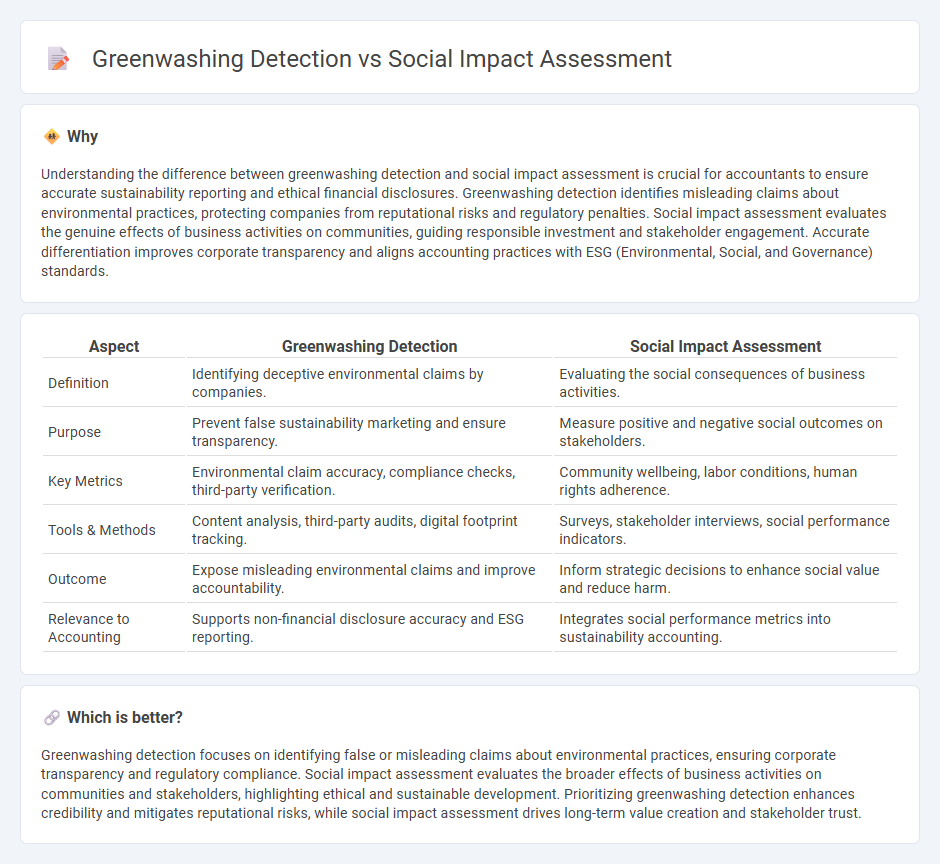
Greenwashing detection involves identifying misleading claims companies make about their environmental practices to appear more sustainable, using data analytics and transparency audits. Social impact assessment evaluates the actual effects of business activities on communities and stakeholders, focusing on measurable outcomes in health, education, and economic well-being. Explore how integrating greenwashing detection with social impact assessment enhances corporate accountability and ethical reporting.
Why it is important
Understanding the difference between greenwashing detection and social impact assessment is crucial for accountants to ensure accurate sustainability reporting and ethical financial disclosures. Greenwashing detection identifies misleading claims about environmental practices, protecting companies from reputational risks and regulatory penalties. Social impact assessment evaluates the genuine effects of business activities on communities, guiding responsible investment and stakeholder engagement. Accurate differentiation improves corporate transparency and aligns accounting practices with ESG (Environmental, Social, and Governance) standards.
Comparison Table
| Aspect | Greenwashing Detection | Social Impact Assessment |
|---|---|---|
| Definition | Identifying deceptive environmental claims by companies. | Evaluating the social consequences of business activities. |
| Purpose | Prevent false sustainability marketing and ensure transparency. | Measure positive and negative social outcomes on stakeholders. |
| Key Metrics | Environmental claim accuracy, compliance checks, third-party verification. | Community wellbeing, labor conditions, human rights adherence. |
| Tools & Methods | Content analysis, third-party audits, digital footprint tracking. | Surveys, stakeholder interviews, social performance indicators. |
| Outcome | Expose misleading environmental claims and improve accountability. | Inform strategic decisions to enhance social value and reduce harm. |
| Relevance to Accounting | Supports non-financial disclosure accuracy and ESG reporting. | Integrates social performance metrics into sustainability accounting. |
Which is better?
Greenwashing detection focuses on identifying false or misleading claims about environmental practices, ensuring corporate transparency and regulatory compliance. Social impact assessment evaluates the broader effects of business activities on communities and stakeholders, highlighting ethical and sustainable development. Prioritizing greenwashing detection enhances credibility and mitigates reputational risks, while social impact assessment drives long-term value creation and stakeholder trust.
Connection
Greenwashing detection and social impact assessment are connected through their focus on evaluating corporate transparency and ethical accountability in accounting practices. Effective greenwashing detection relies on accurate social impact assessments to verify claims about environmental and social responsibility, ensuring financial statements reflect true sustainability efforts. Integrating these processes enhances the credibility of corporate reports and aligns accounting standards with broader environmental, social, and governance (ESG) criteria.
Key Terms
Materiality
Social impact assessment evaluates the tangible effects of corporate activities on communities, emphasizing materiality by identifying significant social risks and benefits. Greenwashing detection scrutinizes marketing practices to expose misleading claims that obscure the true environmental and social impacts, ensuring accountability and transparency. Explore how integrating materiality in these processes drives genuine sustainability performance and trust.
Non-financial reporting
Social impact assessment evaluates the genuine effects of organizational activities on communities and environments, emphasizing transparency in non-financial reporting to ensure accountability. Greenwashing detection scrutinizes corporate communication to reveal misleading claims about sustainability efforts, protecting stakeholders from deceptive practices. Explore deeper insights into enhancing non-financial reporting accuracy and integrity here.
Assurance
Social impact assessment evaluates a project's or organization's real effects on communities and environments, providing transparent data for stakeholders. Greenwashing detection identifies misleading claims about sustainability efforts, ensuring authenticity and preventing reputational risks. Explore our detailed analysis to understand how assurance enhances credibility in both domains.
Source and External Links
Best Social Impact Assessment (SIA) Guide with Template and Tools - Social Impact Assessment is a systematic process to evaluate potential social consequences of projects or policies through steps including public planning, context analysis, screening, and scoping to inform decision-making and create meaningful social change.
Social impact assessment - Queensland Government - Social impact assessment identifies, analyzes, manages, and monitors potential social impacts of projects, focusing on community engagement, workforce, housing, local business, and health, and is mandatory in certain environmental impact statement processes.
Social Impact Assessment, Redesigned - Sopact - Social Impact Assessment evaluates how programs or policies affect communities, with traditional SIAs predicting social risks pre-project and outcome-based tracking measuring actual social changes due to interventions.
 dowidth.com
dowidth.com